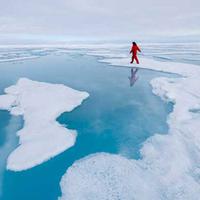
Aug 19, 2010
Erica Carmel was unimpressed in her physics class at MIT when a professor demonstrated that by swinging a bucket full of water around on a rope, he could invert the bucket above him without it dumping all over him. After all, she had made the same discovery when she was five, playing with her Easter egg basket.
When a scientist makes a discovery, is it their brilliant work, the product of a beautiful mind, or is it just out there in the world, waiting for whomever happens to get there first? For Alan Lightman, an author and theoretical physicist, this issue became a profoundly distressing quandary, one that ultimately made him leave science behind.
Discovery doesn't always come so easily. Geologist Rob Reves-Sohn spent a decade at the Woods Hole Oceanographic Institute planning an arctic expedition to one of the ocean's least accessible frontiers. Reporter Erica Lloyd hitched a ride on the ice breaker only to find out that the unknown frontiers don't give up their mysteries without a fight.
Paul Davies, physicist and director of The Beyond Center for Fundamental Concepts in Science at Arizona State University takes on one of the greatest mysteries of all time as the basis of his work. What he wants to know is: Why are we here? It seems so improbable, the more we learn about it. But he theorizes that perhaps our conscious observation of the universe is a part of the grand scheme of the universe and its laws---that our inquiry is fundamental.
Read more:
Falling For Science, edited by Sherry Turkle, in which Erica Carmel's essay appears